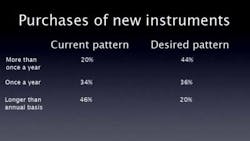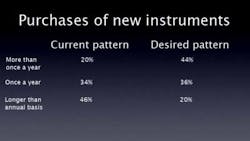Instrument survey
Forty percent of dental hygienists sharpen instruments every day or at least once week, and they favor a manual stone or guide when they do it, according to an RDH eVillage survey.
The survey, which was completed by 421 RDH eVillage readers, opened up with a question about the frequency of sharpening instruments. Since the answers were anonymous, the question emphasized the word "really" in the question, "How often you really sharpen each of your instruments?" The responses were broken into the following categories:
- 22% sharpen each instrument every day
- 18% sharpen once per week
- 20% sharpen every two weeks
- 15% sharpen once per month
- 15% sharpen once every one to three months
- 6% sharpen once ever four to six months
- 4% sharpen once a year
- I answered "new scalers" once a year, but I have them retipped once a year, which is just like a "new scaler." Sorry, there wasn't a retip choice.
- We retip. Our handles are 20 years old. The dental assistant who is in charge of ordering for the office only replaces handles when they break.
- We have been asked by our DDS to cut back on ordering due to difficult economic times
- Doc frowns on ordering them more often. He rolls his eyes when I tell him I need more instruments. Go figure....
- I have to beg the doctor I work for to just get the instruments sharpened. I have been there four years! They have been sharpened twice now. The first time, I paid for it myself. As far as getting new instruments, I probably never will!
- Doctor and his wife feel they can't afford to purchase new instruments. The doctor also doesn't feel that an opening on the hygiene schedule should be used to sharpen instruments (he wants the hygienist working on "recalls" to fill the appointment book). He feels this should be done on "my time" or between appointments (There is actually no time between appointments; therefore, sharpening is done very sporadically.)
- I work in an office with three doctors and five hygienists. Our bosses have us stagger our instrument orders due to the expense.
- Actually I retip my instruments and manually contour them if needed. I work in a perio office and sharpen my instruments before each patient. Working two days per week and seeing 7-8 patients a day, I go through the instruments in about 3 months.
- The costs of our instruments come out of the supply budget in our office. Purchasing instruments puts us "over budget." The office manager asks us to wait until there is a month we are under budget. We are a busy practice with three doctors. We are never below budget.
- Employer says, "Well, let me see what my expenses are and we'll sit down and discuss it." The discussion never takes place until I continuously bug him and then he gives in
- The doctor makes the decision. He wants to order as infrequently as possible.
Responses were also generated in response to another question about sharing instrument set-ups with other hygienists in the office. More than 40% said each hygienist has six to seven set-ups, and 23% indicated that they have eight to nine set-ups. Only 36% share set-ups with other hygienists, and some of the reasons given were:
- I only have to share on days we do triple hygiene and it's not really an issue; however, I take the initiative to try and maintain the instruments' quality for the most part. I would consider this the biggest challenge.
- Making sure that I sharpen only the instruments that I am going to use. So, I can only sharpen the day I am working, the morning of the day I'm working. If I do it too much in advance, another RDH will use the instruments that I sharpened for myself). Also, another RDH might sharpen them too much and make them brittle/broken.
- We don't like the same instruments. I like using graceys. She doesn't.
- The sharpening skills of each hygienist are not the same so we tend to get worn tips much faster.
- Other hygienist prefers dull instruments - ridiculous!
- Not getting the sharpening done and not knowing which instruments have been sharpened and how often
- Some like the instrument tips thick and some like the tips very thin.
- I sharpen all the setups in the office and we then share them. I find that one person sharpening extends the life of the instruments.
- Other hygienists do not sharpen them and do not care for them in the same manner.
- I like two different explorers per bag. Sometimes one gets "lost."
- We have three hygienists in our office and each one uses slightly different instruments. Keeping the instruments in each set-up together is a constant challenge in our office.
- I don't share my sets except with one hygienist, my friend, who works very rarely. I will not share with other hygienists as they sharpen poorly.
- I do work a second office about 25 days per year, The biggest challenge I have with sharing instruments is that I prefer a universal curette over the scaler they have.
- People sharpen differently so the instruments are out of shape.
The survey also inquired when dental hygienists know when an instrument needs to be sharpened; 58% chose the option of "not removing calculus cleanly." Twenty percent said they know due to "the pressure you apply; 15% can tell from a test stick.
Thirty-one percent estimate that a scaler or curette will last 12 to 18 months, while 24 percent say instruments last fewer than 12 months.

